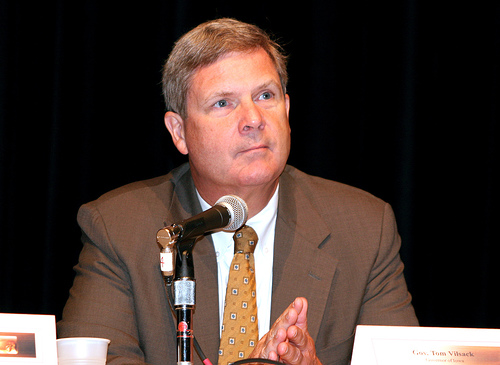
Agricultural News
Vilsack Pleased with OIE Recommendation to Upgrade United States' BSE Risk Status
Wed, 20 Feb 2013 15:15:52 CST

Agriculture Secretary Tom Vilsack made the following statement about notification received from the Scientific Commission for the World Organization for Animal Health (OIE) recommending that the United States' risk classification for bovine spongiform encephalopathy (BSE) be upgraded to negligible risk:
"I am very pleased with this decision and recommendation by the OIE's Scientific Commission. This is a significant achievement for the United States, American beef producers and businesses, and federal and state partners who work in coordination to maintain a system of three interlocking safeguards against BSE that protect our public and animal health. Being classified as negligible risk for BSE by the OIE will also greatly support our efforts to increase exports of U.S. beef and beef products. In recommending that the United States receive negligible risk classification, the Commission stated that the risk assessments submitted for their evaluation were robust and comprehensive, and that both our surveillance for, and safeguards against, BSE are strong. U.S. beef and beef products are of the highest quality, wholesome and produced to the highest safety standards in the world. The United States continues to press for normalization of beef trade with several nations in a manner that is based on science and consistent with international standards. U.S. food and agricultural exporters and consumers worldwide benefit when countries adopt international standards."
Last year, the United States submitted an application and supporting information to the OIE's Scientific Commission to upgrade the United States' risk classification from controlled to negligible. The Commission, in turn, conducted a thorough review before recommending that the risk classification for the United States be upgraded to negligible. Before the OIE's annual General Assembly meeting in Paris, France, in May 2013, delegate countries will have the opportunity to review the Commission's recommendation. The United States expects that formal adoption of negligible risk status for the United States will occur at the General Assembly meeting in May, when it is considered.
The OIE determines a country's risk status based on actions the country has taken to manage the risk of the disease. These actions include instituting a strong ruminant-to-ruminant feed ban, strictly controlling imports of animals and animal products from countries at risk for the disease, and conducting appropriate surveillance.
The OIE Code, which is based on the latest science and current knowledge concerning BSE, provides guidelines for the safe trade of animals and products based on the country's risk status and the risk presented by the specific item being traded. Negligible risk is the lowest risk level under the OIE Code. Countries defined as negligible risk have conducted extensive surveillance and testing in domestic cattle to demonstrate a minimal risk for BSE.
The OIE administers and governs the foundational international standards on animal health as well as trade in livestock and animal products. With a total of 178 Member Countries, including the United States, the OIE is recognized as a reference organization by the World Trade Organization (WTO), the only global international organization dealing with the rules of trade between nations. The official recognition of disease status by OIE of Member Countries is of great significance for international trade and constitutes one of the most important links between the OIE and WTO.
The United States has a longstanding system of three interlocking safeguards against BSE that protects public and animal health in the United States, the most important of which is the removal of specified risk materials from all animals presented for slaughter. The second safeguard is a strong feed ban that protects cattle from the disease. The third safeguard is our ongoing BSE surveillance program that allows USDA to detect the disease if it exists at very low levels in the U.S. cattle population.
WebReadyTM Powered by WireReady® NSI
Top Agricultural News
More Headlines...



















